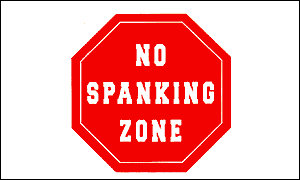Swedish children were the first to get full protection The UK government has missed an opportunity, say children's groups, to join a growing number of countries that refuse to allow children to be hit or smacked - even by their parents.
Instead, the government is considering means to limit in England the circumstances in which parents accused of physical abuse can use in court the 139-year-old defence of "reasonable chastisement".
In the UK, a child can be hit, thumped or struck if a parent can satisfy a court that his or her act constituted "reasonable chastisement".
The eight European countries* that already expressly forbid any kind of physical assault on a child have done so by affording children the same legal rights as adults.
And more countries are, in the same way, paving the way for a ban on hitting and smacking to be made law.
In its defence, the government says that it should not, and does not want to interfere in the private relationship between parents and their children, and that most people know the difference between a "mild rebuke" and assault.
In 1979, Sweden was the first country in the world to prohibit all corporal punishment of children.
European countries that don't smack
- Sweden
- Finland
- Denmark
- Norway
- Austria
- Cyprus
- Croatia
- Latvia
It added a provision to its Parenthood and Guardianship Code which now reads: "Children are entitled to care, security and a good upbringing.
"Children are to be treated with respect for their person and individuality and may not be subjected to corporal punishment or any other humiliating treatment."
The Children's Rights Commission which drafted the legislation emphasised: "The primary purpose of the provision is to make it clear that beating children is not permitted.
Education campaign
"Secondly, the commission wishes to create a basis for general information and education for parents as to the importance of giving children good care and as to one of the prime requirements of their care."Publication of the legislation was followed up with an education campaign lead by the Ministry of Justice, which sent a leaflet to all households with children.
It read: "The law now forbids all forms of physical punishment of children including smacking, etc, although it goes without saying that you can still snatch a child away from a hot stove or open window if there is a risk of its injuring itself."
Four years later, Finland comprehensively reformed its children's law, which included a ban on physical punishment.
Its Child Custody and Right of Access Act 1983 reads: "A child shall be brought up in the spirit of understanding, security and love.
USA Campaign "He shall not be subdued, corporally punished or otherwise humiliated. His growth towards independence, responsibility and adulthood shall be encouraged, supported and assisted."
In May 1987, Denmark amended its Parental Custody and Care Act, so that it read that children "may not be subjected to corporal punishment or other degrading treatment".
The issue had long been debated in the country, and had been the subject of several national opinion polls prior to the amendment.
Two years later in 1987, Norway banned smacking with an amendment to its Parent and Child Act.
It stated: "The child shall not be exposed to physical violence or to treatment which can threaten his physical or mental health."
The Children's Ombudsman's Office in Norway is currently carrying out research to investigate the level of violence against children in the country.
Austria was next to follow suit, altering its Youth Welfare Act to state that "using violence and inflicting physical or mental suffering is unlawful".
Other countries following
The Cyprus House of Representatives unanimously voted in legislation to prevent family violence in 1994. It criminalises "the exercise of violence on behalf of any member of the family against another member of the family".Latvia outlawed smacking children in June 1998. And Croatia prohibited "corporal punishment and humiliation" in January 1999.
Italy, Germany, Bulgaria, Belgium and Ireland are all processing legislation to protect children from physical rebuke.
In the USA and Canada, law on corporal punishment differs from state to state, with some states still allowing caning in schools.
However, groups including Project NoSpank in the US, and the Natural Child Project in Canada, campaign against it.
Editor's note: 9 European countries, not 8, prohibit spanking. The writers missed Italy. For details see "Italy Outlaws Spanking" Release by Susan Bitensky, professor of law at Detroit College of Law at Michigan State University.See also:
18 Jan 00 | UK
Head to Head: Should parents be allowed to smack?18 Jan 00 | UK
Beating children to be outlawed12 Jan 99 | UK
Smacking children 'does not work'12 Jan 99 | Education
Californians want 'no-spanking' zonesInternet links:
National Society for the Prevention of Cruelty to ChildrenCenter for Effective Discipline (anti-corporal punishment organisation, USA)
Return to The Newsroom Index or to Table of Contents

